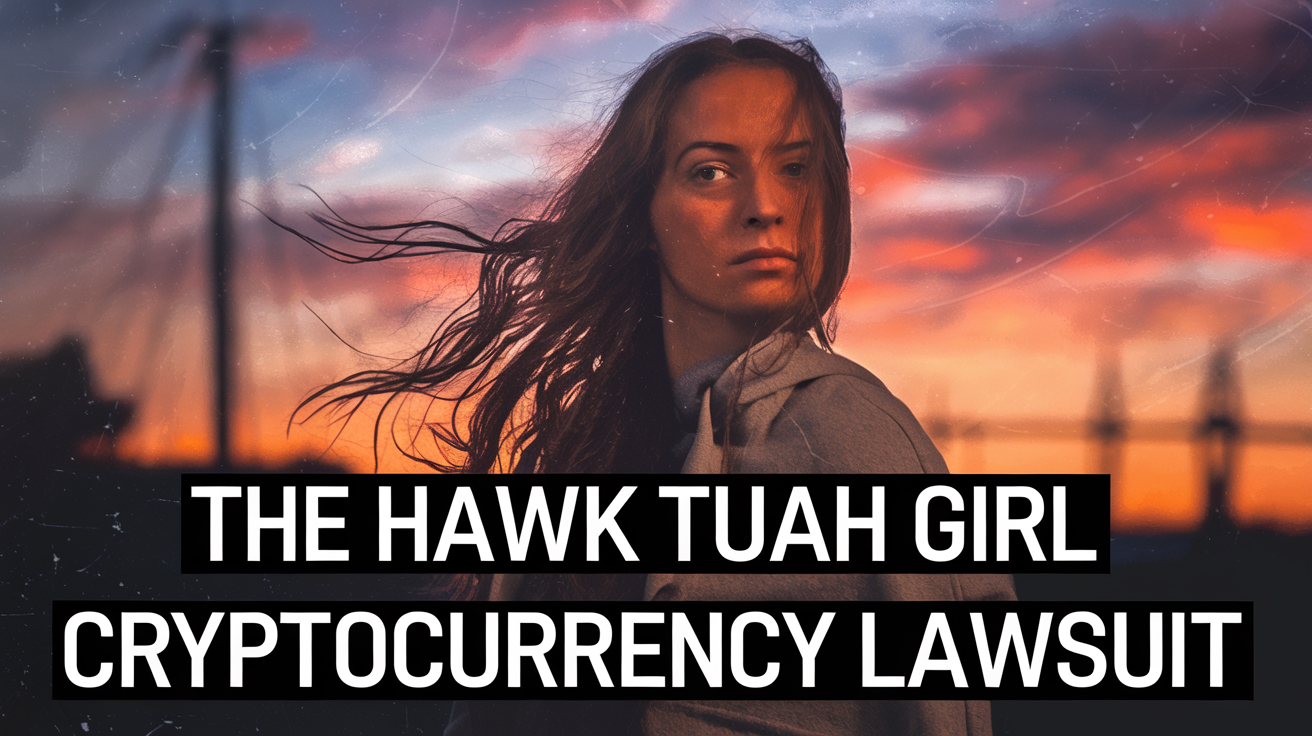A Viral Sensation, a Cryptocurrency Collapse, and a Legal Battle
Hawk Tuah Girl Cryptocurrency Lawsuit: In the ever-evolving world of cryptocurrency, stories of rapid wealth and sudden losses are not uncommon. One such tale that has captured public attention is the Hawk Tuah Girl Cryptocurrency Lawsuit. This incident intertwines internet virality, the allure of digital currencies, and the complexities of legal ramifications. Let’s delve into this intriguing saga.
Who is the Hawk Tuah Girl?
Haliey Welch, affectionately known as the “Hawk Tuah Girl,” catapulted to internet fame in mid-2024. Her candid and humorous response during a street interview, where she used the onomatopoeic phrase “hawk tuah” to describe a spitting action in a sexual context, resonated with millions, making her a viral sensation. This unexpected fame opened doors to various opportunities, from launching merchandise lines to hosting her own podcast, “Talk Tuah with Haliey Welch.”
The Birth of the $HAWK Token

Hawk Tuah Girl Cryptocurrency Lawsuit: Riding the waves of her newfound popularity, Welch ventured into the cryptocurrency space by introducing the $HAWK token in December 2024. Marketed as a memecoin—a type of cryptocurrency inspired by internet memes—the $HAWK token was launched on the Solana blockchain. Welch’s extensive social media following was leveraged to promote this new digital currency, creating significant buzz and anticipation among her fans and crypto enthusiasts alike.
Meteoric Rise and Sudden Fall

Upon its release on December 4, 2024, the $HAWK token experienced an astonishing surge, reaching a market capitalization of nearly $500 million. However, this meteoric rise was short-lived. Within a mere 20 minutes, the token’s value plummeted by over 90%, crashing from its peak to just $41 million. This abrupt decline left investors in shock and led to widespread allegations of foul play.
Allegations and Accusations
Hawk Tuah Girl Cryptocurrency Lawsuit: The rapid collapse of the $HAWK token gave rise to accusations of a “pump-and-dump” scheme—a fraudulent practice where the price of an asset is artificially inflated (“pumped”) to attract investors, only for the perpetrators to sell off their holdings, causing the price to “dump” and leaving other investors with significant losses. Critics, including prominent cryptocurrency journalist Coffeezilla, accused Welch and her team of insider trading and orchestrating an exit scam. Welch and her associates have vehemently denied these allegations.
Legal Actions Initiated

In the aftermath of the token’s collapse, investors sought legal recourse. A class-action lawsuit was filed in the United States District Court for the Eastern District of New York on December 19, 2024. The defendants named in the suit included:
- Tuah The Moon Foundation: The entity responsible for managing the funds from the token sale.
- OverHere Ltd.: The company behind the token’s creation, led by CEO Clinton So.
- Alex Larson Schultz: A Los Angeles-based online promoter associated with the token’s promotion.
Notably, while Welch was not named as a defendant, the lawsuit highlighted how her celebrity status was utilized to generate a speculative frenzy around the $HAWK token.
Haliey Welch’s Response
Facing mounting scrutiny, Welch broke her silence on the controversy. In a statement, she expressed deep concern over the situation, stating, “I take this situation extremely seriously and want to address my fans, the investors who have been affected, and the broader community.” She pledged full cooperation with the ongoing investigations and emphasized her commitment to assisting affected investors. Welch also portrayed herself as a victim, suggesting she was misled by those she trusted in the cryptocurrency venture.
The Role of Influencers in Cryptocurrency
Hawk Tuah Girl Cryptocurrency Lawsuit: The $HAWK token debacle underscores the influential power that internet personalities wield in the digital age. With vast followings, influencers like Welch can drive significant attention and investment toward projects they endorse. However, this incident also highlights the potential pitfalls when influencers venture into complex financial territories without adequate expertise or due diligence. The blending of celebrity culture with high-risk financial instruments like cryptocurrencies can lead to disastrous outcomes for both the promoters and their followers.
Investor Reactions and Consequences
The sudden devaluation of the $HAWK token had profound financial implications for investors. Many reported significant losses, with some claiming to have lost their entire savings. Investor forums and social media platforms were flooded with angry posts, demanding accountability from those involved. Some investors have even organized grassroots campaigns to push for stricter regulations on celebrity-endorsed cryptocurrencies. The controversy surrounding $HAWK has reignited debates about the ethical responsibilities of influencers in financial markets.
The Broader Implications for the Crypto Market
The Hawk Tuah Girl Cryptocurrency Lawsuit is more than just a celebrity-driven scandal; it highlights the vulnerabilities of the crypto market. The case raises concerns about market manipulation, lack of oversight, and the risks associated with investing in digital assets endorsed by influencers. Many experts argue that without stringent regulations, such incidents will continue to erode trust in the industry.
Lessons Learned
This lawsuit serves as a cautionary tale for both investors and influencers. For investors, it underscores the importance of conducting thorough research before investing in any cryptocurrency, particularly those tied to internet personalities. For influencers, it highlights the need to understand the legal and ethical ramifications of endorsing financial products.
The Future for Haliey Welch
As the lawsuit progresses, Welch’s career remains in limbo. While some fans continue to support her, others have distanced themselves due to the controversy. Whether she can recover from this setback will depend on her ability to rebuild trust and navigate the legal challenges ahead.
Regulatory Responses
The fallout from the $HAWK token collapse has caught the attention of regulators. Lawmakers and financial watchdogs are now considering stricter regulations on cryptocurrency endorsements, particularly by celebrities and influencers. Potential measures could include mandatory disclosures, tighter restrictions on influencer marketing, and increased penalties for fraudulent schemes.
Public Perception and Media Coverage
The media has played a significant role in shaping the public’s view of this case. News outlets, crypto analysts, and social media users have dissected every aspect of the lawsuit. While some portray Welch as an unwitting participant in a larger scheme, others see her as a willing accomplice. The ongoing legal battle will likely determine how history remembers her role in this controversy.
Conclusion
The Hawk Tuah Girl Cryptocurrency Lawsuit is a stark reminder of the risks associated with the crypto market. It demonstrates how rapidly fortunes can change and how legal accountability is still catching up to the digital age. Whether this case will lead to substantial changes in crypto regulation remains to be seen, but one thing is clear: investors and influencers alike must tread carefully in this volatile landscape.
FAQs
1. What is the Hawk Tuah Girl Cryptocurrency Lawsuit about?
The lawsuit involves allegations of fraud and market manipulation related to the $HAWK token, a cryptocurrency associated with viral internet personality Haliey Welch.
2. Was Haliey Welch directly involved in the scam?
While Welch was heavily involved in promoting the token, she has denied any wrongdoing. She claims she was misled by those managing the project.
3. What legal actions have been taken against those involved?
A class-action lawsuit has been filed against Tuah The Moon Foundation, OverHere Ltd., and Alex Larson Schultz for their alleged roles in the token’s collapse.
4. What does this lawsuit mean for cryptocurrency regulation?
The case has intensified discussions around stricter regulations for influencer-endorsed crypto projects, potentially leading to new laws governing such endorsements.
5. How can investors avoid falling victim to similar scams?
Investors should conduct due diligence, avoid blindly following influencer promotions, and be wary of projects that promise rapid gains without transparency.




